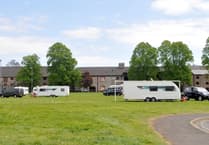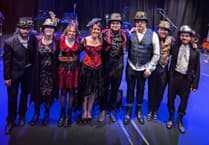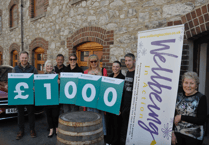A scintillating performance by the Callino brought life to composers old and new at Newton Abbot’s Courtenay Centre last Sunday, writes Jeff Collman
The Quartet has changed since I experienced them several years ago, both in appearance and body language; but I closed my eyes and yes, the three-plus-one have melded superbly. Magnus Johnston’s bold soaring line in one of the Dvorak’s ‘Cypresses’ and his dramatic entrance to the Mendelssohn’s ‘Presto’ was masterful.
However, perhaps it is of the pianissimos that true talent is made: Magnus’ solo near the end of the presto was stunningly engaging. This concert’s programme gave all four instrumentalists a chance to shine, - and how wonderfully they did.
Sarah McMahon introduced us to Haydn as an innovator of his time, and we soon were hearing the nuanced variety and contrasts in his Quartet in D Op 20 No 4, not to mention the rollicking good fun of the final movement unexpectedly fading at its finale.
Tom Hankey introduced us to the selection of Dvorak’s ‘Cypresses’. They had their origins as songs, written at a time when Dvorak was in love. Lyrical and melodic themes pervaded us. The second work, with its alternating periods of strident angst and serene melody brought inclusivity of the facets of life. This rendering touched our heart strings.
Mike Greenway’s ‘Mitnor Remains’ was surprisingly accessible given its inspiration being rooted in fossilized bones. The episodic nature of the piece emphasises the passage of time, be it vertically in depth of animal remains, or the passing of years. The work was premiered at Holne, the birthplace of Charles Kingsley; hopefully it will soon be as widely famous as Kingsley. With the Callino’s rendition, I was transported to the dripping of stalactites.
The enduring pizzicato of the different instruments was unnerving, having different time signatures: quite the sensation of unregulated cave drips. Glissandi seemed to dispel the sense of timeless security - we were after all in sink-hole territory - but I must confess I never felt the crash of a descending hippo. This piece surely must enter other international quartets’ repertoires, being both unusual to perform and interesting to listen to: bravo Callino.
Rebecca Jones spoke about Magnus having recently joined the quartet, he being no stranger, and she having known him since school days. Then, into Mendelssohn’s Quartet in A minor Op 13, written when he was 18, influenced by Beethoven and being in love. A tentative expectant introduction preceded warmth and passion.
A following fugal section surely denoted the strange complications of life, passion, angst and drama; it was all there, before the Callino’s breathtakingly calm resolution. The third movement’s light relief danced with delicate pizzicato. The final movement burst upon us, then developed into recapitulations of earlier themes.
However, this is a work of love, and appropriately drew to conclusion with the tenderest of quietude that faded into nothingness. That state held the audience for several moments in complete silence: something really special had been shared. The concert was sponsored by Ray and Sue.





Comments
This article has no comments yet. Be the first to leave a comment.